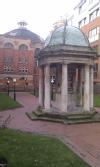About the Hispanic Liverpool Project
OverviewThe Hispanic Liverpool Project investigates what Liverpool's forgotten Hispanic history can tell us about the city's role as a hub in the networks of trade, commerce, migration, travel, tourism, politics and culture that connected the Anglophone and the Luso-Hispanic worlds during the long nineteenth century (i.e. from approximately 1800 until the First World War). Through the Hispanic Liverpool Database and Hispanic Liverpool Community Collection, the project gathers, records and interprets the stories of the people who inhabited those networks, the trading connections they forged and exploited, the places they lived, worked and are remembered, and the traces we can still find of them today, in Liverpool and elsewhere. MethodsThe Hispanic Liverpool Project works with a range of sources, including shipping records, trade directories, census returns, church records, newspaper articles, travel guides, memoirs and company archives. It combines a macrohistorical approach, which aims to understand Liverpool's place in the grand narratives of nineteenth-century Anglophone and Luso-Hispanic national and imperial networks, with a microhistorical approach that pays close attention to the stories of individual people, voyages, connections, objects, encounters and events. Read more about the methodology behind the Hispanic Liverpool Database. Key Aims
|

'Olinda' in Aigburth Drive, Liverpool, once the home of the Brocklehurst family, who traded with the Brazilian city of Olinda.

Roscoe Memorial Garden in Mount Pleasant, Liverpool, which includes a plaque commemorating Spanish exile Joseph Blanco White.
